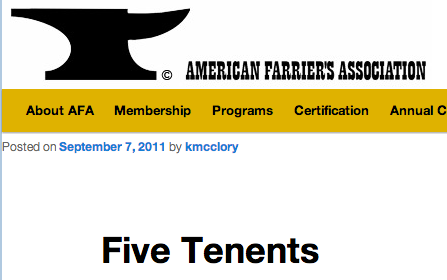Tenents
« previous post | next post »
The form and content of Barack Obama's Second Inaugural have stimulated even more than the usual amount of commentary, including some analyses of linguistic interest. For today, I'll limit myself to noting that one aspect of the president's performance gave Bryan Garner a case of the vapors:
Listening to the Inaugural Address now. Oh dear. President Obama said "tenants of our faith" this morning instead of "tenets."
— Bryan A. Garner (@BryanAGarner) January 21, 2013
Mr. Garner was right about the pronunciation:
Audio clip: Adobe Flash Player (version 9 or above) is required to play this audio clip. Download the latest version here. You also need to have JavaScript enabled in your browser.
And as Ben Zimmer pointed out, the president has used this pronunciation before:
@bryanagarner Wouldn't be the first time: languagelog.ldc.upenn.edu/nll/?p=2902#co…
— Ben Zimmer (@bgzimmer) January 21, 2013
It's clear from the frequency of misspellings on the web that this is a fairly common pronunciation. It's also easy to find explicit discussion of the question, as in these comments at the Merriam-Webster site:

Or this plaintive appeal to Yahoo Answers:
And there are many other cases where the pronunciation-influenced misspelling is questioned only by being mixed in with the standard spelling:
 |
< |
 |
 |
There are several reasons why people might get confused — -ent and -ant are common word-endings, derived from Latin present participles; relatively few Latin words inflected for person have been borrowed into English (fiat, caveat, credo, ignoramus, …); the earlier /n/ may tend to perseverate in perception (and thus later in production), as in the case of pundit / pundant; and so on.
Anyhow, it's interesting to see President Obama getting a little bit of the excessive linguistic scrutiny that used to be directed at George W. Bush, at least in some other area than alleged over-use of first person singular pronouns. But I'm happy to say that so far, "He mispronounced tenets!" doesn't seem to have the popular resonance of Jacob Weisberg's "He said 'Grecians'!", or George Will's "If you struck from Barack Obama’s vocabulary the first-person singular pronoun, he would fall silent".

amandachen said,
January 23, 2013 @ 12:05 pm
Here's what the OED says.
tenent, n. Obs.
[a. L. tenent ‘they hold’, 3rd pers. pl. pres. indic. of tenēre to hold.]
= tenet.
Etymologically a tenet ought to be the opinion of one, what he holds, a tenent the opinion of a number, what they hold; but this distinction, if ever observed in using the words as English, was soon lost. Tenent was apparently more used in the 17th c. than tenet, but became obs. c 1725.
[(myl) Interesting — I should have checked the OED. And their are some notable examples, e.g. Roger Williams' appeals for separation of church and state, The Bloudy Tenent of Persecution for Cause of Conscience (1644), and The Bloody Tenent yet More Bloody (1652).
But frankly, I doubt that President Obama is trying to return us to the state of the language in the 17th century, as congenial an idea as that might be — I think he just got it wrong, as many other people do. Then again, if enough people go down his road, they can one-up their critics by claiming to be using the historically-preferred version. Maybe I'll try it…]
Rod Johnson said,
January 23, 2013 @ 12:09 pm
I like the perseveration analysis. I imagine there's a continuum of nasality on that vowel and a threshold over which the [t] is perceived as /nʔ/. I've observed the same thing with tomato, where the nasality of the /m/ persists all the way through the final /o/, and, in some speakers at least, clearly sounds like [tʰɨmẽjnõw], though the [n] is more like a nasalized tap.
Dw said,
January 23, 2013 @ 12:27 pm
I think there must be some semantic confusion with "tenant" ("one who occupies land").
If the phenomenon is purely phonetic, then why doesn't it also affect Bennet, bonnet, gannet, rennet, or sonnet?
[(myl) Perhaps so. I suppose there's a potential association between holding land and holding propositions — after all, tenant is from French tenir which in turn is from Latin tenere. Or maybe there was some preservation in speech, if not in writing, of the plural "tenent" form?]
Dw said,
January 23, 2013 @ 1:02 pm
In reply to MYL's reply, there is a notable parable of Jesus known, among other things, as the Parable of the Tenants. I note that two of the "tenents" links in the article are from Christian churches. Perhaps there is some connection there.
Cy said,
January 23, 2013 @ 2:45 pm
@Rod Johnson I like that. I've never really even noticed that before, but you're right. I hear it all the time – great example of nasality for English speakers.
And @Dw – the phonetics _might_ be due to some kind of consonant harmony, maybe. Because "tenet" starts where it ends, there might be a little more attention paid by producers to the consonant. There's also the simple fact that English has no analogue phonetically for the other words you list – there's no bonnent, sonnent or rennent to potentially confuse us by sounding acceptable. Likewise we have pendant and fondant etc. – I can't think of any minimal pairs in English with a -t/-nt distinction (I will think of dozens after I post, certainly). So maybe we just aren't vigilant about that coda.
Just thought of hot/haunt – but of course they're not both nouns, so no confusion. Not like tenet/tenant.
Goatherd said,
January 23, 2013 @ 3:10 pm
@Cy – inherit/inherent?
J.W. Brewer said,
January 23, 2013 @ 3:43 pm
So Garner himself misspelled the admittedly-archaic "tenents" as "tenants"? Muphry's Law in action!
J.W. Brewer said,
January 23, 2013 @ 3:52 pm
I'm wondering as a methodological matter how widespread on the WWW a variant spelling needs to be before it ought to be considered good evidence of a variant pronunciation. For example, I since childhood have idiosyncratically pronounced "cantaloupe" as "cataloupe/catalope" (the President may have put my missing "n" to use pursuant to some sort of conservation law), and while I would love it if Bill Labov could demonstrate that this is a Delaware Valley regionalism I think it may just be me. One can certainly find plenty of instances of the n-less spelling of the melon in question (with both -loupe and -lope) out there via googling, but how does one determine whether that's evidence of how the people typing it actually pronounce the word, or whether instead these are just plain old typos that don't mean anything other than that pretty much any letter in a long enough word can and does occasionally get omitted by accident while typing?
Jeff Carney said,
January 23, 2013 @ 4:21 pm
I was thinking of the dentality more than the nasality.
Dw said,
January 23, 2013 @ 4:27 pm
Bryan Garner has a seventeenth-century peeving predecessor:
"The Bloody Tenet (I mean the booke styled by that name, tending to discuss an holy and wholesome truth of God, slanderously stiled the Bloody Tenent)"
http://quintapress.macmate.me/PDF_Books/The_Bloudy_Tenent_Washed%20_v1.pdf
[(myl) And not just any old "seventeenth century peeving predecessor" — that's John Cotton himself! (or "John Cotton hissownself", as my mother would have put it…)] It's at the very start of his reply to Roger Williams:
]
Neal Goldfarb said,
January 23, 2013 @ 6:27 pm
@J.W. Brewer: "So Garner himself misspelled the admittedly-archaic 'tenents' as 'tenants'?"
Actually, I think it's more complicated (and objectionable) than that. Garner seems to be assuming that Obama used the wrong word (tenant 'leaseholder, lessee') rather than that he used the right word (tenet 'belief') but pronounced it in a nonstandard way. Under Garner's assumption, Obama's mistake looks worse than it looks under the alternative assumption.
If Obama had been speaking off-the-cuff, it would be difficult if not impossible to figure out what he thought he was saying. But of course he wasn't improvising; he was reading from a prepared text. If you looked at that text, you could see what word he was reading.
The text released by the White House press office has the word as tenets. My guess would be that this a copy of the text Obama was reading from, rather than a transcript, but I can't say for sure. (The text includes the notation "(Applause)" at various points, but those might have simply been added in to the preexisting text.)
Narmitaj said,
January 23, 2013 @ 8:11 pm
@Cy re Dw – How about sonant as a plausible phonetic analogue for "sonnet"? Not very common generally, except possibly around these parts: "(Linguistics/Phonetics & Phonology) Phonetics denoting a voiced sound capable of forming a syllable or syllable nucleus".
Cy said,
January 23, 2013 @ 8:40 pm
@Narmitaj Yeah that would work, both the same part of speech – but the Venn diagram of people who would know and use sonant and who are also typically mindful of variant pronunciations (since they're basically talking about sounds!) is basically a circle. More so than users of tenant/tenet, maybe.
J.W. Brewer said,
January 23, 2013 @ 10:33 pm
Neal G.: i certainly don't want to defend Garner, but I don't know how you can tell what he meant. For example, if someone criticized a speaker for saying "ax" instead of "ask," I would take that as a non-standard-pronunciation criticism (with the eye-dialect spelling of the non-standard pronunciation happening to be the same as a standard spelling of an entirely different word) rather than a wrong-word criticism.
M.N. said,
January 23, 2013 @ 11:18 pm
Also relevant might be pronunciations like "pundint" and "punnant" for "pundit", (e.g. by Sarah Palin: http://languagelog.ldc.upenn.edu/nll/?p=2902). Among the words with similar phonotactics, "pundit" and "tenet" are probably some of the more "foreign"-seeming ones (below a certain threshold of obscurity, e.g. "sennet" is probably too obscure to be eggcorned…plus it sounds like "senate" anyway).
Apropos of nothing, I usually pronounce this word /tɛnɛt/, but the OED doesn't give that as a pronunciation.
Neal Goldfarb said,
January 24, 2013 @ 12:25 am
@J.W.: " i certainly don't want to defend Garner, but I don't know how you can tell what he meant. "
From Garner's Modern American Usage (3d ed.):
This is followed by three quotes in which tenant is used instead of tenet.
Garner is on firmer ground here than re: Obama, since it's clear in these examples which word-form was intended to be used—namely, the one spelled t-e-n-a-n-t. However, it occurs to me that these examples are ambiguous in exactly the same way as the Obama quote was (if you ignore the question of what the text said): it's not clear whether the writers of the examples were committing malapropisms or misspellings. If the latter, the writers presumably think that there are two separate words spelled that happen to be pronounced and spelled the same way, just like the two words spelled b-a-n-k.
However, the entry in GMAU makes it clear that Garner regards tenant-for-tenet as a case of misusing tenant rather than of misspelling tenet:
Tom Saylor said,
January 24, 2013 @ 5:19 am
"We recall that what binds this nation together is not the colors of our skin or the tenets of our faith or the origins of our names."
Would it have been permissible, maybe even more natural, to say instead "what bind this nation together are"?
John F said,
January 24, 2013 @ 8:57 am
Tennents? That's a Scottish lager! *hic*
M.N. said,
January 24, 2013 @ 2:22 pm
@Tom: with "what binds this nation together are", that sentence gets a "*" in my grammar. There could be a dialect difference, though. (It reminds me a little of German "das sind".)
To make the plural grammatical here, I'd have to replace the free relative with something like "the things that bind this nation together". (And even then, it's not great with the negation.) It's also worth noting that I drew the inference from Obama's sentence that there's one unique thing that binds the nation together (presumably something like a love of freedom — I didn't hear the whole speech), while "the things" presupposes that there's more than one. Since these are clefts, that's not surprising.
Derwin McGeary said,
January 24, 2013 @ 2:33 pm
Putt/punt for a sportsman's double.
Brett /Brent might do for searchable names that could be confused.
What was that cool rhetorical trick with "a King", using the indefinite article to elevate him? Or just to avoid confusion with Elvis?
Brett said,
January 24, 2013 @ 5:14 pm
@Derwin McGeary: I can attest that Brent is a common mispronunciation of my name, even among people who know what my name is supposed to be. But it doesn't happen with people I know quite well, presumably since the correct "Brett" is firmly fixed in their minds.
Amanda said,
January 25, 2013 @ 3:25 pm
Lent and (depending on your pronunciation) lit or let.
Set or sit and scent
Bit and bent.
There are a surprising number of these. I personally like the conservation of nasalization as an explanation. A nasalized t has a lot in common with an n, one could easily be mistaken for another, especially if you assume the president is falling pray to the common American tendency to drop final consonants. He could also be converting the final t into a glottal stop, which might also be mistaken for an n. Not having heard the speech myself, I can't say for sure, but there's a good chance this is less mispronunciation and more misperception.
Rod Johnson said,
January 25, 2013 @ 6:16 pm
None of those examples have an earlier nasal in the word that can influence the perception of the vowel though. But met and meant and similar words do.
Marja Erwin said,
January 25, 2013 @ 8:49 pm
Not being familiar with this, I'm not sure how t and nt can sound much alike – n and nt, or nd and nt, yes, but set sounds very different from sen–, send, or sent.
But as Amandachen above, tenent is a perfectly good word, more appropriate than tenet in this context, and more useful than tenet in most contexts. Isn't it possible that tenent hung on in spoken English even if tenet, inappropriately, supplanted it in printed English?
M.N. said,
January 25, 2013 @ 10:42 pm
That's probably *why* 'tenet' supplanted it. In some 19th-century texts, you see "exeunt" as a noun (an example from Zebulon Pike that I found on Google: "causing the Indians to make their exeunt from the world's stage"). This isn't part of my grammar (or that of most other speakers, I assume): for me it's "her exit", "their exit", "my exit" (and I really doubt that any English speaker would say "my exeo from the room").
Similarly with tenet/tenent: let's say we're talking about the tenets, or tenents, of a faith. Is it "the tenets of the faith", because "faith" is singular? Or is it "tenents" because they're the beliefs of the plurality of people who belong to the faith? The English language's eventual answer seems to have been "Who cares? Let's just use the less marked form."
"Isn't it possible that tenent hung on in spoken English even if tenet, inappropriately, supplanted it in printed English?"
Well, there are plenty of people who still say 'tenet' exclusively (I didn't even hear it pronounced 'tenent' until I was in high school at the earliest, and I wasn't aware that 'tenent' was an actual word until reading this post), and it's so common that people like Garner consider 'tenent' an error. But it would be pretty hard to tell for sure whether this is a new phenomenon. (For the time being, I'm thinking of 'pundint' and putting my money on "yes".) Maybe someone should look for tokens of the word in historical audio recordings or something?
David Marjanović said,
January 27, 2013 @ 12:16 pm
Concerning "exit", there's always the Latin noun exitus.
(In German it's the traditional medical euphemism for "death".)